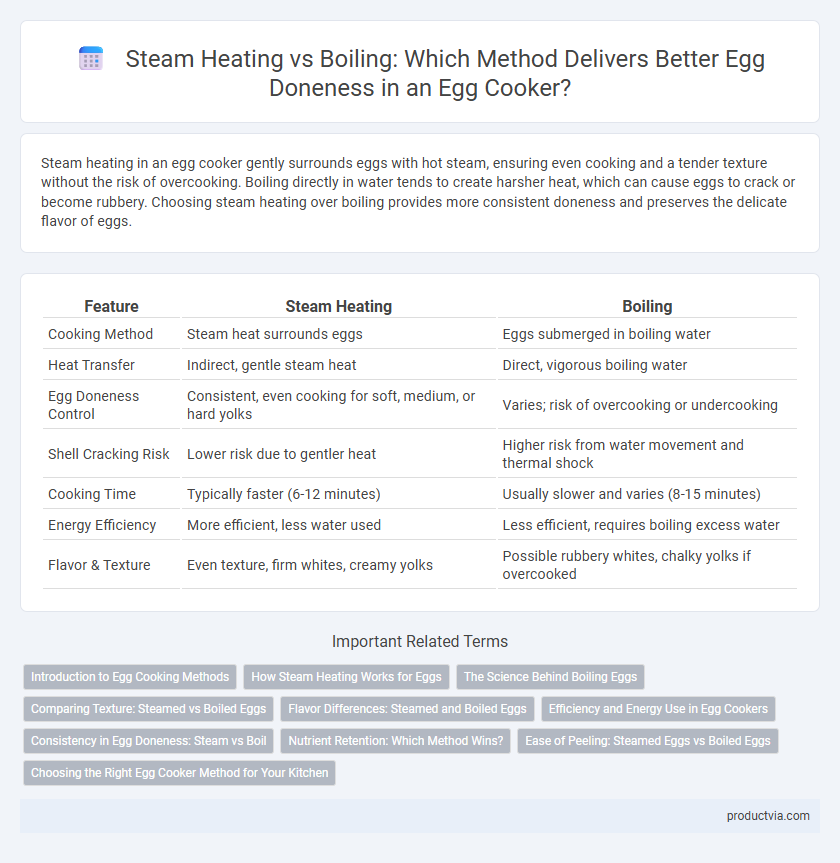Steam heating in an egg cooker gently surrounds eggs with hot steam, ensuring even cooking and a tender texture without the risk of overcooking. Boiling directly in water tends to create harsher heat, which can cause eggs to crack or become rubbery. Choosing steam heating over boiling provides more consistent doneness and preserves the delicate flavor of eggs.
Table of Comparison
| Feature | Steam Heating | Boiling |
|---|---|---|
| Cooking Method | Steam heat surrounds eggs | Eggs submerged in boiling water |
| Heat Transfer | Indirect, gentle steam heat | Direct, vigorous boiling water |
| Egg Doneness Control | Consistent, even cooking for soft, medium, or hard yolks | Varies; risk of overcooking or undercooking |
| Shell Cracking Risk | Lower risk due to gentler heat | Higher risk from water movement and thermal shock |
| Cooking Time | Typically faster (6-12 minutes) | Usually slower and varies (8-15 minutes) |
| Energy Efficiency | More efficient, less water used | Less efficient, requires boiling excess water |
| Flavor & Texture | Even texture, firm whites, creamy yolks | Possible rubbery whites, chalky yolks if overcooked |
Introduction to Egg Cooking Methods
Steam heating preserves more nutrients in eggs compared to boiling by cooking them with hot vapor rather than direct water contact. Boiling involves submerging eggs in rapidly boiling water, which can lead to water infiltration and uneven doneness. Steam heating offers precise temperature control, resulting in consistent texture and optimal yolk and white firmness.
How Steam Heating Works for Eggs
Steam heating for eggs involves surrounding the eggs with hot steam at temperatures typically around 100degC, which transfers heat efficiently through condensation on the eggshell. This method ensures rapid and even cooking by maintaining consistent moisture and temperature levels, preventing overcooking and preserving egg texture. Steam heating penetrates the eggshell gently, resulting in precise control over egg doneness compared to boiling, where direct water contact can cause uneven heat distribution.
The Science Behind Boiling Eggs
Steam heating transfers heat more efficiently than boiling water, allowing precise temperature control essential for achieving perfect egg doneness. Boiling immerses eggs in water at 100degC, while steam can evenly surround the egg, cooking it more gently and reducing cracking. The science behind boiling eggs reveals that steam's consistent heat maintains protein coagulation without overcooking, resulting in superior texture and flavor.
Comparing Texture: Steamed vs Boiled Eggs
Steamed eggs typically have a tender, creamier texture due to gentle and evenly distributed heat, preserving moisture better than boiling. Boiled eggs often develop a firmer white and a slightly chalky yolk because of direct water contact and higher heat intensity. This difference in cooking methods directly impacts the egg's consistency and overall mouthfeel, favoring steaming for a delicate finish.
Flavor Differences: Steamed and Boiled Eggs
Steamed eggs retain a more intense, pure egg flavor due to gentle cooking that preserves moisture and prevents water infiltration, resulting in a creamier texture compared to boiled eggs. Boiling often causes some flavor dilution and can lead to a slightly rubbery consistency as direct water contact alters the egg's proteins. Flavor enthusiasts prefer steaming for rich, well-rounded taste and tender whites.
Efficiency and Energy Use in Egg Cookers
Steam heating in egg cookers offers faster cooking times and more consistent heat distribution compared to boiling, resulting in improved energy efficiency. Steam requires less water and heats eggs evenly without prolonged exposure to high temperatures, reducing overall electricity consumption. Boiling often involves longer heating periods and higher water volumes, making steam-based egg cookers a superior choice for energy savings and quicker egg doneness.
Consistency in Egg Doneness: Steam vs Boil
Steam heating ensures more consistent egg doneness by maintaining a stable temperature around 212degF, allowing eggs to cook evenly without direct contact with boiling water. Boiling can cause uneven cooking due to water movement and temperature fluctuations, often resulting in cracks or overcooked edges. The gentle, uniform heat of steam minimizes these issues, producing perfectly cooked eggs with consistent texture and doneness every time.
Nutrient Retention: Which Method Wins?
Steam heating preserves more nutrients in eggs compared to boiling because it exposes eggs to less water, reducing nutrient leaching, especially water-soluble vitamins like B-complex and C. Studies show that steamed eggs retain higher levels of antioxidants and maintain better protein integrity due to gentler cooking temperatures. For optimal nutrient retention, using a steam egg cooker is preferable over traditional boiling methods.
Ease of Peeling: Steamed Eggs vs Boiled Eggs
Steamed eggs create a gentler cooking environment that results in a more tender egg white and a slightly looser membrane, making them significantly easier to peel compared to boiled eggs. Boiled eggs experience direct contact with rapidly boiling water, which often causes the membrane to adhere tightly to the shell, increasing peeling difficulty. The steam heat method minimizes shell cracking and reduces peeling time, offering a superior choice for easy-to-peel eggs.
Choosing the Right Egg Cooker Method for Your Kitchen
Steam heating in egg cookers offers faster, more even cooking by circulating hot steam around eggs, preserving texture and preventing overcooking compared to traditional boiling. Boiling involves immersing eggs in water, which can lead to inconsistent doneness and cracking due to direct water contact and temperature fluctuations. Choosing a steam-based egg cooker enhances precision and convenience, making it ideal for households seeking consistent soft, medium, or hard-cooked eggs with minimal monitoring.
Steam heating vs boiling for egg doneness Infographic

 productvia.com
productvia.com